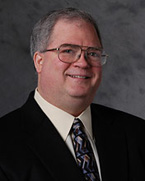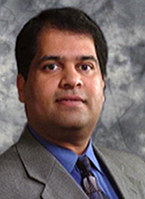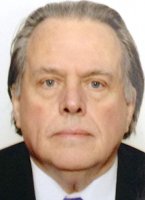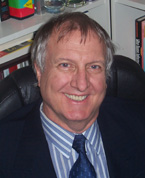Speakers

Curt Breneman
Professor and Department Head, Department of Chemistry and Chemical Biology
Director, Rensselaer Exploratory Center for Cheminformatics Research
Rensselaer Polytechnic Institute
Breneman's research focuses on understanding and modeling the relationships that exist between molecular structure and function. The highlight of his research is his invention of an entirely new kind of molecular modeling called the Transferable Atom Equivalent (TAE) method. The TAE method allows accurate reconstruction of electron density distributions for very large numbers of drug-sized molecules, or for a few very large protein-sized molecules in a short time frame. Small molecule electron densities can be reconstructed with great speed, enabling large databases to be scanned for desirable combinations of electronic properties in a short period of time. The results of the reconstruction efforts yield sets of electron density-derived molecular property descriptors, as well as atom-centered multipolar representations of molecular electrostatic potential fields. Breneman holds a PhD in Organic Chemistry from the University of California, Santa Barbara.

Martin Fritts
Emeritus Researcher, SAIC-Frederick, Frederick National Laboratory for Cancer Research
Research Associate and Contractor, Materials Measurement Laboratory, NIST
Martin Fritts is an emeritus researcher at SAIC-Frederick, Frederick National Laboratory for Cancer Research, and a research associate and contractor in the Materials Measurement Laboratory at the National Institute of Standards and Technology. Dr. Fritts supported SAIC-Frederick in implementing NCI's Cancer Nanotechnology Plan and the establishment of the Nanotechnology Characterization Laboratory at FNLCR, and he works with NIST in their programs in nanotechnology, informatics, and the Materials Genome Initiative. His primary interests are in the development of advanced imaging and measurement instrumentation, modeling and simulation to elucidate structure-activity relationships of nanomaterials in biological environments, and informatics systems to aid in improving data quality and advancing knowledge-sharing. Dr. Fritts also serves as the co chair of the American Society for Testing and Materials' E56.02 Subcommittee on Nanotechnology Characterization, and is a member of ANSI's US Technical Advisory Group for ISO/TC 229, Nanotechnologies. Before joining SAIC-Frederick, he developed and prototyped nanotechnology applications for industry and government through SAIC's Nanotechnology Initiatives Division. His previous experience includes work in computational physics with the Naval Research Laboratory and with SAIC on computational fluid dynamics, simulation-based design, ship design, and nuclear fusion. His work has emphasized collaboration in science and its translation to applications, involving work with industry, academia and government, and including projects with DARPA, DOE, DOD, DTRA, NASA, NRO, ONR, EPA, FDA, AFOSR, DOC, MARAD, and the USACE. Dr. Fritts earned a PhD in nuclear physics from Yale University.
Kimberly Guzan
Research Engineer, RTI International
Nanomaterial Registry
Guzan is the program manager for the Nanomaterial Registry Project which seeks to integrate broad nanomaterial data in a Registry of comprehensively curated, validated data on a scale suitable for decision making. She has also worked on developing advanced nanotechnologies for energy efficient lighting, personal protection materials, and other advanced technologies. Kimberly did her undergraduate studies in Chemical Engineering at Youngstown State University and performed her graduate studies in Polymer Science program at The University of Akron.
 Patrick Herron
Patrick Herron
Senior Analyst for the Kimberly J. Jenkins Chair for New Technologies in Society
Duke University
Patrick Herron is a Senior Analyst at Duke University serving the Kimberley J. Jenkins Chair for New Technologies in Society, and the Art, Art History, and Visual Studies Department. Patrick's responsibilities cover a broad range of research and development roles centered on technology mining, capability analysis, and forecasting. His current work focuses on studying global nanotechnology diffusion, policy, research, commercialization and private investment through a combination of bibliometrics, text mining, web mining, social network analysis, and value chain analysis. Using his experience in software systems developer and information science, Patrick has developed GLOBONANO, a large database and analytics platform for mining nanotechnology-related research literature, international patents, private investments and corporations, in conjunction with the Center for Nanotechnology in Society at UC-Santa Barbara (CNS-UCSB) and the Center for the Environmental Implications of Nanotechnology at Duke (CEINT).
In 2012 Patrick was an expert contributor to the Report to the President and Congress on the Fourth Assessment of the National Nanotechnology Initiative for the Executive Office of the President of the United States President’s Council of Advisors on Science and Technology (PCAST). Previously Patrick contributed core text mining technologies for SparkIP, a patent retrieval and analysis spinoff, and subsequently developed a tool for visualizing intellectual property platform historiographies.
Patrick's other work focuses on the analysis of art markets as part of the Duke Art, Law & Markets Initiative (DALMI). He was co-PI of Fantasy Collecting, a web-based instructonal game allowing students to participate in an art market game as traders. Other projects include tracking the diffusion of hate speech and hot-button topics in Twitter networks; reading the changing topology of critical theory and new media studies literature; designing and developing an ensemble of analysis tools to analyze the informational flows of global culture; and teaching new media theory courses. Patrick's recent book on the potential of text analytics for pharmaceutical innovation, Text Mining for Genomics-based Drug Discovery (VDM Verlag Dr. Mueller), was published in 2008.

Qiang Huang
Associate Professor and Gordon S. Marshall Early Career Chair in Engineering
Epstein Department of Industrial and Systems Engineering
University of Southern California
Dr. Huang's research has been focusing on quality and productivity improvement for advanced manufacturing systems under uncertainties, with special emphasis on Integrated Nanomanufacturing and Nanoinformatics (INN). The INN research will lead to new methodologies and tools for improving nanomanufacturing process repeatability through interdisciplinary research. Dr. Huang's research has been supported by National Science Foundation (NSF) (including the prestigious NSF CAREER award) and Office of Naval Research. Dr. Huang has served as an Associate Editor (Quality, Micro and Nanomanufacturing Systems) for SME Journal of Manufacturing Systems since 2008. He was one of the editors for Special Issue of the IIE Transactions on Quality and Reliability Engineering/Manufacturing and Design: "Quality, Sensing and Prognostics Issues in Nanomanufacturing". He was a member of scientic committee (Editorial Board) for the North American Manufacturing Research Institution (NAMRI) of SME, 2009-2011. He was Associate Editor (Automation in Meso, Micro and Nano-Scale) for 2009 and 2010 IEEE Conference on Automation Science and Engineering. Huang holds a Ph.D. in Industrial & Operations Engineering and an M.A. in Statistics from the University of Michigan, and a Ph.D. in Mechanical Engineering from Shanghai Jiao Tong University.

Frederick Klaessig
Manager
Pennsylvania Bio Nano Systems
Fred Klaessig is currently Manager at Pennsylvania Bio Nano Systems, a small firm focusing on reference materials used in investigating chromatographic effects at the nanoscale. In recent years, he was first the Technical Director for Aerosil & Silanes and later the Business Director for the Aerosil Business Line, which are currently part of the Inorganic Materials Business Unit of Evonik Degussa GmbH. His assignments ranged from commercial overview (Product Management, Production, Sales) to technical responsibilities involving customer support, new product introduction, liaison with the R&D Department in Germany and regulatory matters. AEROSIL® is a trade name for fumed silica, which has been manufactured for 60 years and which is often cited as an example of a nanoparticle. Fumed silica, fumed titania and other fumed metal oxides are utilized in many fields for reinforcement, rheology control, abrasion and UV absorption. In recent years, the great interest in nanotechnology has raised safety and registration concerns about materials of this class. These issues, both everyday technology and EHS, led to his involvement in ASTM (E56), ISO (TC229) and industry organizations addressing these broader topics.
Fred received a B.Sc. in Chemistry from the University of California, Berkeley and a Ph. D. in Physical Chemistry from Rensselaer Polytechnic Institute. His earlier industrial experiences were with Bio Rad Laboratories as a Quality Control Chemist and various R&D management positions at Betz Laboratories, now a division of GE Water Services, where his responsibilities involved scale, corrosion and microbiological control in many chemical industrial processes.
Sharon Ku
Assistant Research Professor
Drexel University
Sharon Ku trained as a physicist before joining the field of science studies where she studied the sociology of laboratories, particularly with respect to the production of precision measurements and standard objects. Her doctoral dissertation explored the social and political dimensions behind the production of the first nanosize standard—the NIST (National Institute of Standards and Technology) certified Gold Nanoparticle Reference Material. Her Stetten Fellowship extended this work to explore the history of the National Cancer Institute’s (NCI) Nanotechnology Characterization Laboratory (NCL) and the roles of government, industry and universities in making nanotechnology-enabled products. Currently, Ku is working with Dr. Stephen Zehr of the Department of Sociology at the University of Southern Indiana, on an NSF project about "interdisciplinarity" that extends her study of nanotechnology practice from government-owned, scientist-led national laboratories to university -owned, social scientist-led federal-sponsored nanocenters.
Sharon Ku received her Ph.D in the History and Philosophy of Science at Cambridge University in September 2009, and joined the Office of NIH History in November 2009. In September 2011 she joined the Department of Sociology, University of Southern Indiana as a research fellow, and a guest researcher of the NIH History Office. She is currently a Assistant Research Professor at Drexel University.

Dr. Ajay P. Malshe
Founder and Chief Technology Officer
NanoMech Inc.
Dr. Ajay P. Malshe (Ph.D. 1992) is a leading pioneer in the Nanomanufacturing field and the science of Convergent Assembly of Nanomaterials for real world breakthrough engineering applications. Ajay is the Founder and Chief Technology Officer (CTO; EVP) of NanoMech Inc. NanoMech Inc. is a Materials Science company equipped with a Nanomanufacturing factory enabling four divisions to introduce an array of products. NanoMech associates represent the best of the best scientists and engineers who ThinkSmall™ to deliver world-class product innovations. NanoMech values People, Ideas and Tools, respectively, for enhancing quality-of-life in a sustainable manner, using these nanotech product innovations.
Today NanoMech has delivered breakthrough nano innovations in machining and manufacturing, lubrication and energy, biomedical implant coatings and strategic military applications. The divisions of NanoMech are – Machining (TuffTek®) and Lubrication (TriboTuff®), Sustainable and Biocide Additives (nGuard®) and Functional Metal Nanopowders (ElementX®).
Ajay is recognized world-wide for a number of award-winning inventions and discoveries, many of which are now real products, in a wide variety of areas such as: the world’s first commercial cubic boron nitride coating for cutting tools; breakthrough multicomponent nanolubrication for extending the life of fossil fuel hydrocarbon supply chain; multifunctional biocide materials; nano electromachining of sub 20 nm scale structures for device application; bio degradable nanomaterials for biomedical applications; integration of advanced electronics for three dimensional systems for high end computation, and more.

William Morris
Chairman
Nano Data Search, Inc.
A physicist by training, Mr. Morris has spent his career developing and bringing cutting-edge and innovative technologies to market. He has founded and managed several companies in multiple sectors from oil and gas to nanotechnology and advanced materials. He is chairman of Emerging Technology Ventures LLC, a London-based venture capital fund, and chairman of Nano Data Search, Inc. He is also a director of Nano Risk Assessment, Inc. Nano Data Search, Inc. is focused on deploying powerful computational tools to seamlessly bridge and mine big data sets with advanced analytics in the field of nanotechnology in order to enhance research and development, analyze risks, and expedite commercialization. Areas of focus include: environmental, health and safety of engineered nanomaterials; nanomaterial characterization; and advance material design and development.

John Rumble
President, R&R Data Services
Dr. John Rumble has long been a leader in developing and providing access to databases in a numerous S&T disciplines. From 1980 through 2004, he worked in the NIST Standard Reference Data Program and later was responsible for NIST measurement services programs. From 2004 to 2011, He was Executive Vice President of Information International Associates in Oak Ridge, Tennessee. Today he is President of R&R Data Services in Gaithersburg MD. In recent years, he has been especially active in the area of nanomaterials and presently is Chair of an international, multi-disciplinary Working Group on the Description of Materials on the Nanoscale. Rumble received a Ph.D. in Chemical Physics from Indiana University.
Steven Shade
Managing Director, Center for Advanced Manufacturing
ManufacturingHUB
Purdue University
Shade's current efforts are focused on developing manufacturing and product lifecycle management research programs, industry – university research collaborations, and serving as chairperson for CAM's manufacturing summit series. Steve also serves as Interim Associate Director for Purdue's Technical Assistance Program.
Steve received his B.S. in Mechanical Engineering from Virginia Tech and began his career as a Nuclear Test Engineer for General Dynamics Electric Boat Division where he led reactor and reactor systems testing on SSN688 Los Angeles Class submarines. After graduate studies in acoustics and turbomachinery at Rensselaer Polytechnic Institute, he served as a Senior Component Engineer responsible for the design and testing of SSN21 Seawolf Class and NSSN Virginia Class seawater pumps. After completing his M.S. Management degree from Purdue's Krannert School of Management, Steve served as a Senior Materials Engineer at Intel Corporation, where he was responsible for certification, sourcing, and ongoing quality for desktop interconnects. Steve is currently a lead instructor and Advisory Board member for MIT's Lean Advancement Initiative Education Network and also represents Purdue on the Great Lakes Manufacturing Council and is a member of Evonik Degussa's Tippecanoe Laboratories Community Advisory Panel.

Mark Tuominen
Director, National Nanomanufacturing Network
Co-Director, NSF Center for Hierarchical Manufacturing and MassNanoTech
Professor of Physics, University of Massachusetts Amherst
Mark Tuominen is a Professor of Physics and Director of the Center for Hierarchical Manufacturing and MassNanoTech at the University of Massachusetts Amherst. His research interests include experimental condensed matter physics. Research in the fabrication and physics of nanoscale devices and materials. This includes two primary research areas: nanostructures from self-assembling block copolymer templates and nanoscale device physics. The first area addresses the general scientific challenge of fabricating nanoscale structures by a convenient method and providing appropriate electrical interfacing to these structures. To adress this challenge, diblock copolymer films are used as a convenient self-assembling template for the fabrication of arrays of nanoscale elements. This results in a new fabrication method for producing integrated devices using block copolymer templates in combination with other lithographic methods. Research includes work on terabit-density single-domain magnetic arrays, magnetotransport devices, field-emission arrays, electrochemical sensor arrays, and thermoelectric cooling elements. The second research area explores issues involved in single charge transport. This includes single-electron investigations of mesoscopic superconductors and, more recently, experimental and theoretical studies on charge shuttle devices, which involves quantum charge transport coupled with mechanical vibration. Tuominen holds a PhD in Physics from the University of Minnesota.


